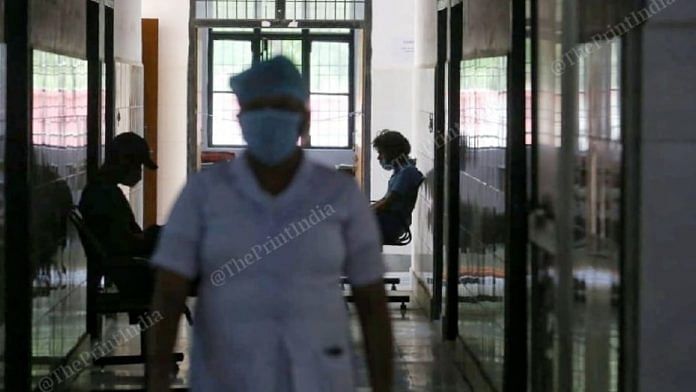Agra: In the out patient department of Agra’s Institute of Mental Health and Hospital, a 33-year-old woman sits with her husband, hand in hand. Awaiting her turn to walk into the doctor’s chamber, she asks her husband for sanitiser. And then sprays it all over her chair.
A mother of two, the woman suffers from hallucinations, morbid jealousy, delusions and insomnia. Her condition has deteriorated over the last couple of weeks. On Tuesday, she removed her clothes on the streets, which prompted her husband to get her admitted at the institute.
As the woman sits in the corridor, a doctor walks up to her, and asks about her education, age and family. She answers.
The doctor follows up by asking if she knows about Covid-19 and vaccination.
She replies: “Yes, I know corona. Hand washing, santisation, bathing are preventive measures. Vitamins, juices are important to fight the disease. I will get vaccinated soon as well.”
She then goes on to talk about random things, at length, her memory switching between locations and incidents.

At a time when the second Covid wave is prevailing across the country and vaccine hesitancy due to lethal combinations of ill-conceived notions, false information, and mistrust has come up as a major cause of concern, the situation at this mental health institute is considerably under control.
On Tuesday, ThePrint visited the institute to find out how it is coping with the pandemic, and how patients are being educated about social distancing, masks and vaccination.
Also read: IMA wants Ramdev booked for sedition over vaccine remarks, writes to PM Modi
Containing the virus & vaccination
There are 270 patients currently residing at this facility — 120 women and 150 men.
Patients are there commonly for neurosis (mental disorder involving distress but not delusions or hallucinations), psychosomatic disorder (condition caused by mental problems rather than physical problems), and psychosexual disorders (sexual problems that are psychological in origin and occur in absence of any pathological disease).

While patients here remained untouched in the first wave, over 35 patients tested Covid-positive in the second wave in mid-April. There are no active cases now.
“We had over 35 Covid-positive cases here this time. The outbreak took place due to new admissions of asymptomatic individuals who had initially tested negative in RT-PCR tests during the time of admission,” says Dr Aarti Yadav, a psychiatrist at the institute.
Asked how the facility managed to contain the spread, Yadav says, “Each dorm has 20 patients, so as soon as one patient complained of fever and tested positive, we started contract tracing and immediately isolated them. The last patient recovered about 10 days ago. All of them are healthy now”.
The facility also set up an in-campus vaccination camp a fortnight ago, and 37 patients over the age of 45 were given the first dose of the Covid vaccine.
The next camp is scheduled to be held early next month.
Also read: New drug candidates from Australia could prevent Covid infection, stop disease in its tracks
How the institute trained patients to take shots, wear masks
According to the institute’s doctors, unlike the conditions outside, patients here have no insecurities about the vaccine, and comply with all Covid protocols.
“They trust us and listen to everything we say. This is an unprecedented situation and none of us were prepared for it. But unlike ‘normal, healthy people’ who think the vaccine will kill them and even sterilise them, patients here say no such thing. Once explained, they all readily agree for vaccination,” says a senior doctor, not wishing to be named.
Moreover, every patient in the OPD section appears with a mask.
Asked how difficult it has been to tackle the crisis and teach the patients about the importance of wearing masks, Yadav says: “I wouldn’t say this has been an easy journey but patients here trust us. To educate them, we apply various techniques — verbal education and awareness, modelling and repeated reminders”.

She calls modelling the “most useful technique”. “Doctors and nurses go to the wards and dorms and show patients how to wear a mask. We tell them that we are wearing masks, so you have to wear them as well to save the world. Once they see all of us wearing masks regularly, they imitate and follow,” she says.
“In certain cases of dementia, we have to repeatedly, consistently remind them and also sometimes go on to make them wear masks ourselves,” she explains.
Dr Dinesh Singh Rathor, the medical superintendent of the institute says it is a “common misconception” that patients at such mental health facilities are “aggressive and don’t listen”.
“With proper counselling, medication care and attention, everyone can lead a healthy and normal life. Only 3 per cent of cases of mental health illness are severe,” he adds.
Also read: Lancet Citizens panel suggests 8 steps to Modi govt and states on how to tackle Covid
Keeping tabs on stress level amid lockdown
Due to the Covid induced lockdown in Uttar Pradesh, visits by the patients’ family members has become infrequent. However, doctors at the facility say they still allow families to interact with the patients from a safe distance so it doesn’t stress them further.
“It is extremely important to keep the patients stress free, especially in these grim times. Stress triggers mental health issues. Not seeing their family members for a long time can increase the problem,” says Yadav.
Patients also make regular calls and video calls to their loved ones.
Moreover, the facility offers telephonic consultation to patients who have been released after recovering, and to others who call up with issues like insomnia, depression, anxiety etc.
“Covid has triggered bouts of depression and anxiety. Many of the patients who were back home cannot come down here due to lockdown, so we try as much as we can to offer consultation via calls,” adds Yadav.
Also read: Sputnik V makers agree to supply Covid vaccine to Delhi, says CM Arvind Kejriwal



